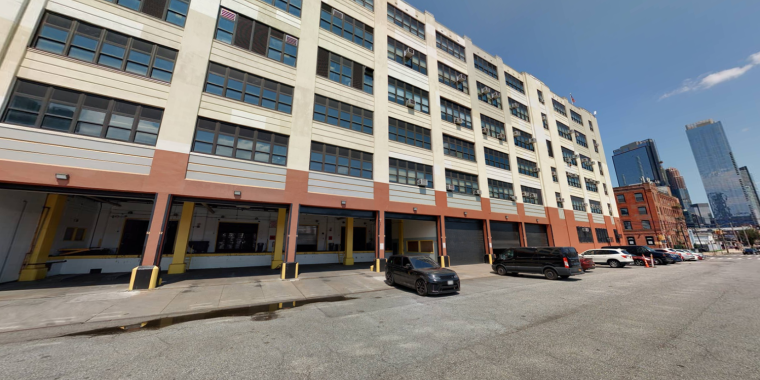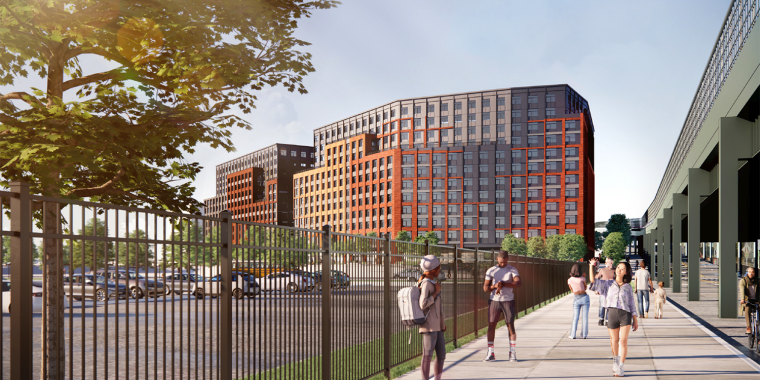NYCEDC Welcomes Climate Tech Companies Selected to Participate in Pilots at BAT Program

Program Welcomes Pliant Energy Systems, Armstrong World Industries, LG CNS, and Extends Partnership with EV Startup Matcha for Next Installation of ‘Pilots at Bat’
Continued Success of the Program Brings Expansion to Nearby MADE Bush Terminal in Sunset Park, Furthering the District’s Standing as a Hub for Climate Innovation and Business Development
Partnerships Advance Green Economy Action Plan and Climate Innovation Goals, Bringing Accessible Clean Services and Transportation to New Yorkers
BROOKLYN, NY—Today, New York City Economic Development Corporation (NYCEDC) welcomes three new companies to its Pilots at BAT program, Pliant Energy Systems, Armstrong World Industries, and LG CNS will partner with Matcha, who deployed electric vehicle (EV) chargers at the Brooklyn Army Terminal (BAT) in July 2024. As a result of the success of the first nine participants in Pilots at BAT, the program is expanding its reach to NYCEDC’s MADE Bush Terminal campus, providing more space and alternative environments.
Piloting technology includes Pliant Energy’s underwater robot that will demonstrate its ability to conduct underwater surveys and marine infrastructure inspections in the waters adjacent to the MADE campus. Armstrong's Energy Saving Ceiling panels installed at the BAT operations office will utilize phase change material (PCM) to improve indoor thermal comfort and enhance energy efficiency. Finally, LG CNS is pairing cutting-edge EV charging equipment with new software and operations services from Matcha, a former BAT pilot company, to enhance drivers' digital experience, reduce friction, and enhance driver sharing. The Armstrong Templok® Energy Saving Ceilings pilot is being led by INF Associates (INF), a turnkey energy services firm with offices in New York and New Jersey. INF is also supporting LG CNS and Matcha in their pilot project implementation.
“The Adams administration is continuing to leverage City assets like the Brooklyn Army Terminal to serve as incubation sites for cutting-edge technology and innovations that accelerate the growth of New York City’s green economy,” said Deputy Mayor for Housing, Economic Development, and Workforce Adolfo Carrión, Jr. “NYCEDC’s Pilots at BAT program will ensure that companies have the space and supports they need to test and scale high-impact climate tech, and then grow their business and impact in New York City to create jobs and confront the climate crisis.”
“The Pilots at BAT program continues to act as a launchpad for companies to test and scale new cutting-edge technology that will unlock solutions for the climate crisis and create fresh economic opportunity for the city,” said NYCEDC President & CEO Andrew Kimball. “Leveraging NYCEDC's real estate assets to drive innovation is a cornerstone of New York City's Harbor of the Future and Green Economy Action Plan—and by expanding the Pilots at BAT program to MADE Bush Terminal, we are further cementing Brooklyn's Sunset Park as a hub for world-class climate innovation.”
“I'm proud that Brooklyn has become a hub for forward-thinking climate tech and innovation, and the Brooklyn Army Terminal is an epicenter of that growth,” said State Senator Andrew Gounardes. “This is about supporting homegrown, New York entrepreneurs as they take on the toughest challenges of our time, and it's helping us create a robust green economy that works for all New Yorkers. Congrats to this new cohort of entrepreneurs and to NYCEDC for pushing this program forward.”
“I’m excited to see the Brooklyn Army Terminal welcoming three forward-thinking companies to its PILOT and BAT programs,” said Congressman Daniel Goldman. “Pliant Energy, Armstrong Ceiling Solutions, and LG CNS are all driving forces in innovating the future of sustainable technology. Their partnerships will further solidify the Terminal’s role as a leading center for green and efficient tech development in New York City.”
“New York City’s climate future is being built right here in Sunset Park, and the success of Pilots at BAT shows how local innovation, sustainability, and economic equity can go hand-in-hand. This program helps startups scale transformative technology while advancing our broader goals around workforce development, climate resiliency, and cleaner infrastructure. I proudly champion investments that position our industrial campuses as national models for inclusive, forward-looking climate solutions,” said New York City Councilmember and Majority Leader Amanda Farías.
“NYCEDC has been a critical partner in bringing cutting-edge technology to the five boroughs,” said New York City Department of Transportation Commissioner Ydanis Rodriguez. “Congratulations to the Pilots at BAT team on welcoming the next class of climate tech companies. There is no doubt our future is brighter, healthier, and more sustainable as a result of the investments made in this program.”
Installation has begun and will continue over the next few weeks. Piloting activities are expected to run for six to 12 months during which companies collect data that is critical to achieving their next commercialization milestone. NYCEDC accepts applications on a rolling basis from companies that are developing hardware climate technologies within NYCEDC’s priority green economy sectors, resiliency, mobility and buildings. Pilots are selected based on a number of criteria including demonstrated pilot need, potential for impact, and technical feasibility.
NYCEDC launched the Pilots at BAT program in September 2023 to activate a key real estate asset and provide the opportunity for companies to test their innovative technologies on the path to commercializing their product or services and scaling throughout New York City. Participating companies have translated their pilots into different follow-on opportunities including prototype development, unlocking local and state incentives, securing new funding, and generating new revenue streams through corporate partnerships.
Some recent achievements of companies who have completed the Pilots at BAT program include:
- Matcha, an EV charging technology and operations company, delivered over 1,100 charging sessions to EV drivers in Sunset Park. During the pilot, Matcha achieved NYSERDA and ConEd networking software approvals, qualifying the firm's technology for regional deployment across the greater New York City region. Matcha has since received $1.7M in grant funding from the Massachusetts Clean Energy Center to deploy hundreds of EV chargers at apartment buildings across the state of Massachusetts.
- Benchmark Labs piloted an IOT weather station at Pier 4 as the enabling hardware to collect real time data and validate their artificial intelligence (AI) point specific 15-day weather model. The pilot expanded their technology applications to the offshore wind industry, in addition to the agricultural sector where Benchmark Labs is already commercially deployed.
- Popwheels and Swobbee, deployed battery swapping cabinets at the Brooklyn Army Terminal and Essex Market, in partnership with NYC DOT and Newlab through the NYC DOT Public E-Bike Charging Pilot. The pilots allowed the startups to work with FDNY on their approval for safe installation and identify a secondary market for charging cabinets in NYC.
- Revert Technologies, developer of AI enabled smart plug load controls, leveraged the pilot to refine their product design, software features, and cybersecurity framework. With the visibility of the pilot and operational experiences gained from implementation, Revert raised a $1.2M seed round that has provided the capital runway to develop their second gen product and scaled deployment of its solution to now over 2,000 plugs across schools, gyms, hotels, and offices in eight different states.
This announcement builds on New York City’s “Green Economy Action Plan”, announced by Mayor Adams in his 2024 State of the City address, which lays out a series of commitments and strategies to grow the city’s green economy while positioning New Yorkers of all backgrounds to benefit from the nearly 400,000 projected green-collar jobs in New York City by 2040.
A critical component to the Green Economy Action Plan is the creation of the Harbor Climate Collaborative, a partnership between the Brooklyn Navy Yard, NYCEDC, and the Trust for Governors Island, to collectively invest $725 million to build a green economy ecosystem across 6-million-square-feet and 72 acres linked by the NYC Ferry across New York Harbor. Last November, the Harbor Climate Collaborative pledged to double the number of pilots conducted across the collaborative and structure the program so that companies benefit from both campus-specific experiences and collaborative-wide networks, and funding opportunities. As part of the collaborative, NYCEDC will invest up to $100 million to develop a world-class Climate Innovation Hub at BAT, which will serve 150 startups over 10 years—generating $2.6 billion in economic impact and creating 600 jobs—and provide local workforce training and job placement for New Yorker of all backgrounds.
“These BAT Pilots provide a great example of how public-private partnerships can leverage businesses’ technological innovation to power us towards a greener industrial future. We are excited for the expansion of this program to the MADE campus and the new opportunities this will bring to Southwest Brooklyn,” said Southwest Brooklyn Industrial Development Corporation (SBIDC) Executive Director Jesse Solomon.
“Brooklyn is proud to be a center of sustainable innovation. We’re excited to welcome this new cohort of forward-thinking companies and applaud NYCEDC for driving inclusive growth. The Brooklyn Chamber is here to support these efforts and help businesses thrive as we shape a more resilient and equitable future,” said Brooklyn Chamber of Commerce President & CEO Randy Peers.
“Congratulations to Pliant Energy Systems on expanding their piloting to the Brooklyn Army Terminal, and to all of the companies that have been admitted to the latest iteration of the Pilots at BAT program,” said Brooklyn Navy Yard Development Corporation President and CEO Lindsay Greene. “Following several months of testing at the Brooklyn Navy Yard, the expansion of Pliant’s testing needs in a new urban environment is a perfect example of the importance of the Harbor Climate Collaborative. Our continued partnership to leverage all three waterfront sites to provide a proving ground and a path toward commercialization for promising climate tech companies is providing the foundation needed to identify additional mitigation and adaptation solutions.”
“We're thrilled to congratulate NYCEDC on today's milestone and look forward to charting these companies' progress during their pilots,” said Trust for Governors Island President and CEO Clare Newman. “Together, we are making meaningful strides towards our shared goal of doubling the number of pilot projects supported across the three Harbor Climate Collaborative sites—an effort that is helping to grow New York City’s green economy and foster new opportunities for climate innovation.”
“We are thrilled to have the chance to showcase the EV charging units at the Brooklyn Army Terminal and to further our expansion across New York City and in other DX solutions. As we continue to innovate, our focus remains on integrating advanced IT technology to enhance digital transformation and create smarter, more connected urban environments,” said LG CNS Vice President of New Business Unit, Sook Meslin.
“Matcha's EV charging pilot at the Brooklyn Army Terminal with NYCEDC served as an incredibly helpful product and software user testing lab for our team. We were able to test and learn quickly across hundreds of software and notification experiments in just weeks, in a live field environment,” said Co-founder and CEO of Matcha Chris Kluesener. “This allowed us to shave 6 months off our development timeline and understand new tactics to best encourage drivers to proactively manage their vehicles and charging session habits to enable better sharing with neighbors.”
“This pilot will be a key enabling resource for Pliant's growth in NYC to showcase the groundbreaking capabilities that our robots bring for potential customers. Our low impact, near-shore operations stand to be a transformative shift for City stakeholders and for coastal underwater work more broadly,” said Pliant Energy Systems Director of Engineering Carles Civit.
“INF is proud to support the Pilots at BAT program and commends NYCEDC for its on-going leadership and commitment to innovative climate tech. The Armstrong Templok Ceiling with phase change material has enormous potential to improve energy efficiency and thermal comfort in NYC buildings and support citywide decarbonization efforts.” said INF Associates President & Founder Charlie dePuthod. “We also thank NYCEDC and LG CNS/Matcha for the opportunity to participate in an important pilot to advance high-quality and accessible EV charging in NYC.”
“The support we received through the Pilots at BAT program was instrumental in helping us move quickly through regulatory hurdles and demonstrate the viability of our solution in New York City,” said Popwheels Co-Founder Baruch Herzfeld. “This kind of partnership is exactly what climate infrastructure startups need to scale—we’re proud to be part of the city’s green future.
“The pilot allowed an early-stage startup with a novel technology like Revert to find its place in a commercial setting. From IT cybersecurity evaluation to implementation and post-install customer service, we learned from how to do things the right way during the pilot to now being able to confidently service facilities 50 times the pilot scale,” said Revert Technologies CEO Ryan Li.
“Our pilot at the Brooklyn Army Terminal was a pivotal milestone for Benchmark Labs - it not only validated our technology in real-world conditions but also opened doors to industry partners in offshore wind and NYC officials. The experience gave us critical traction and visibility in a space hungry for precise, point-specific weather insights. We’re especially grateful to the team at the NYC EDC for their incredible support—they were collaborative, responsive, and instrumental to the pilot’s success,” said Benchmark Labs Co-founder and Chief Strategy & Operations Officer Ulrik Soderstrom.
“Thanks to the support of NYCEDC and our pilot partners, we’ve been able to demonstrate how safe, accessible battery swapping infrastructure can be rapidly deployed to meet the urgent needs of New York’s growing micromobility sector. We’re proud to be part of a program that doesn’t just talk about climate innovation—it accelerates it,” said Swobbee US Corp. Managing Director Stephan von Wolff.
Sunset Park in South Brooklyn is poised to be an emerging hub for climate innovation. The waterfront district has extensive industrial infrastructure, a diverse array of tenants and uses, and connection to major transportation networks. NYCEDC’s primary assets in Sunset Park include the Brooklyn Army Terminal, South Brooklyn Marine Terminal, and MADE Bush Terminal. Each of these assets provides unique opportunities for innovation and business development, and they support a just transition to decarbonize New York City’s economy.
In addition to advancing New York City’s “Green Economy Action Plan”, the Pilots at BAT program build on Mayor Adams’ efforts to develop a “Harbor of the Future” a multifaceted initiative announced by Mayor Adams in his 2024 State of the City address to reimagine New York City’s waterfront and fuel 21st-century growth and innovation.
About NYCEDC
New York City Economic Development Corporation is a mission-driven, nonprofit organization that works for a vibrant, inclusive, and globally competitive economy for all New Yorkers. We take a comprehensive approach, through four main strategies: strengthen confidence in NYC as a great place to do business; grow innovative sectors with a focus on equity; build neighborhoods as places to live, learn, work, and play; and deliver sustainable infrastructure for communities and the city's future economy. To learn more about what we do, visit us on Facebook, Twitter, LinkedIn, and Instagram.


